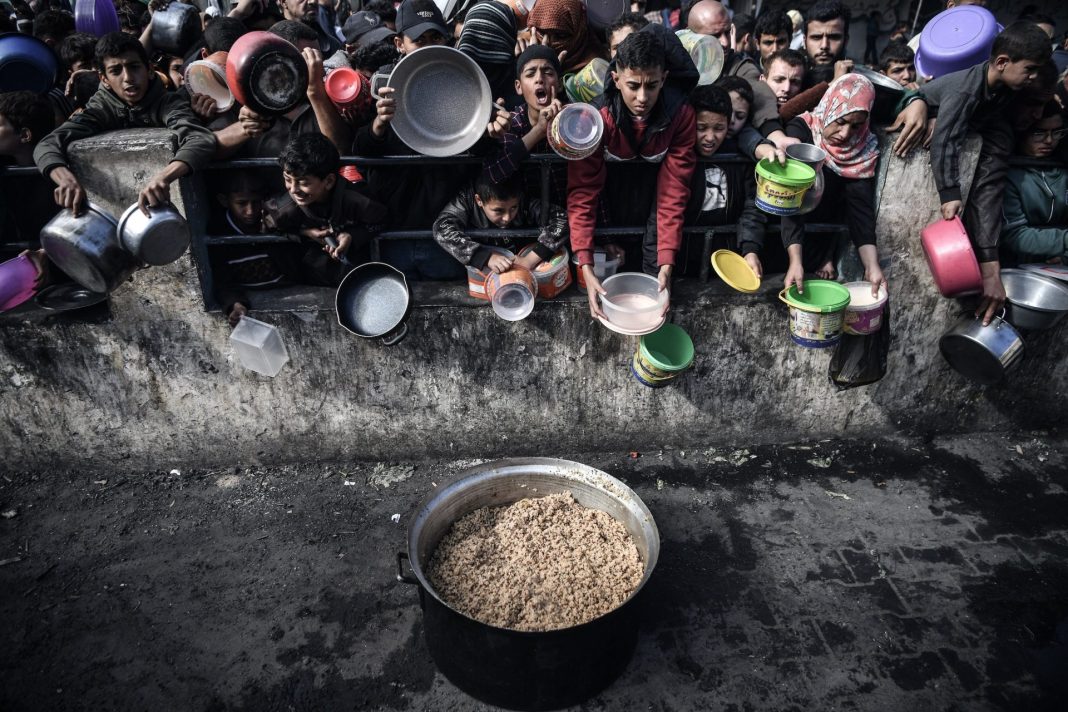No food or aid of any kind has entered northern Gaza since 1 October amid a massive ground operation launched by the Israeli army.
The obstruction of humanitarian access and the intensity of the bombing campaign has significantly increased the risk of famine for residents in northern Gaza as food, water, fuel and medical supplies dwindle.
In a new UN-backed assessment, the Integrated Food Security Phase Classification (IPC) said around 1.84 million people across Gaza are living through high levels of acute food insecurity, including 133,000 people who are suffering “catastrophic” food insecurity.
The IPC, which conducted its new analysis between 30 September 30 and 4 October, is expecting the number of people experiencing catastrophic hunger to nearly triple in the coming months.
“Between November 2024 and April 2025, almost two million people, more than 90 percent of the population, are classified in IPC Phase 3 (Crisis) or above, of which 345,000 people (16 percent) are in Catastrophe (IPC Phase 5), and 876,000 people (41 percent) in Emergency (IPC Phase 4),” the IPC added.
The IPC classifies the most extreme warning as Phase 5, which has two levels, catastrophe and famine.
An estimated 60,000 cases of acute malnutrition among young children were expected between September 2024 and August 2025, it noted.
In December, the IPC reported that the percentage of families in Gaza experiencing severe acute food insecurity is the highest ever documented worldwide, outranking Afghanistan and Sudan.
UN human rights chief Volker Turk described the assessment as “beyond terrifying”.
“This crisis is principally the consequence of decisions made by the Israeli authorities. It is in their power to change the situation – urgently,” he said, adding that the starvation of civilians as a method of warfare constitutes a war crime.
While the entry of food aid had increased since May, the IPC said, humanitarian access began shrinking again in September. Israel has also stopped processing requests from traders to import food to Gaza, choking off a crucial source of provisions.
“The risk of famine persists across the whole Gaza Strip. Given the recent surge in hostilities, there are growing concerns that this worst-case scenario may materialise,” the IPC added.
The monitoring body expects Rafah and northern Gaza to likely face more severe acute food insecurity.
In recent weeks, the Israeli military has ordered the full evacuation of northern Gaza’s remaining 400,000 people, following the start of its major ground operation in the area on 6 October.
The Jabalia refugee camp has been one of the focuses of the military campaign, which has trapped people in their homes across the north for weeks.
Palestinians fear that the Israeli army is in the process of laying the groundwork for what has come to be known as the “General’s plan”, which involves depopulating northern Gaza and then besieging the region – including preventing the entry of humanitarian supplies – to starve out anyone left, including Palestinian fighters.
UN Secretary-General Antonio Guterres stressed that he was alarmed by the IPC analysis.
“Famine looms. This is intolerable. Crossing points must open immediately, bureaucratic impediments must be removed, and law and order restored so UN agencies can deliver lifesaving humanitarian assistance,” he wrote on social media.
The World Health Organization (WHO) Chief Tedros Adhanom Ghebreyesus has also warned that almost everyone in the Gaza Strip is going hungry, calling this situation “inhumane”.
“WHO calls for immediate access for all humanitarian aid, starting with food and medicine for severely malnourished children, who need to be treated urgently,” Tedros Adhanom Ghebreyesus wrote on X.
WHO continues to call for a cease-fire as “best medicine is peace”, he added.
Israel has continued its military onslaught on Gaza following a cross-border attack by the Palestinian group Hamas on October 7 last year, despite a UN Security Council resolution calling for an immediate cease-fire.
More than 42,500 people have since been killed, mostly women and children, and over 99,500 injured, according to local health authorities.
The Israeli onslaught has displaced almost the entire population of the Gaza Strip amid an ongoing blockade that has led to severe shortages of food, clean water, and medicine.
Israel faces a genocide case at the International Court of Justice for its actions in Gaza.
